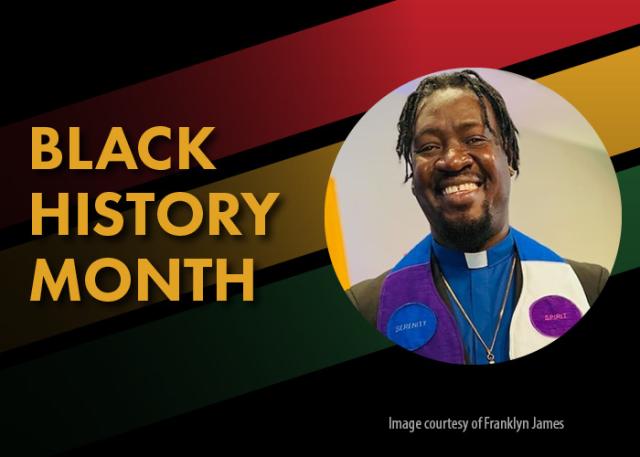Black History Month is a powerful reminder of our shared humanity.

This blog post is part of our series for em>Black History Month 2024.
I sat at my desk with fingers gliding rapidly over the smooth keypad. Words sprang to life on the screen, echoing the thoughts swirling in my mind. Some thoughts vanished with a simple delete keystroke, while others crystallized into sentences, shaping a narrative on the observance of our collective Black journey. This observance, which began in the United States as Negro History Week in 1926 and evolved into Black History Month by 1976, serves to celebrate the often-unseen contributions of Black Americans.
Black History Month was officially recognized in Canada in 1995, thanks to the efforts of the Ontario Black History Society and individuals like Dr. Jean Augustine, who holds a special place in our shared stories and journey. I recall the stories my friends, family, and colleagues shared about their struggles and triumphs and how these narratives mirror the broader experiences of Black Canadians. Their resilience and achievements are woven into the very fabric of our nation, showcasing an evolving recognition and appreciation of our rich and diverse histories. This observance resonated within various communities, including my own experiences within The United Church of Canada, where it reminds us of our shared pains, humanity, and collective journey.
From literature to science, from arts to politics, Black Canadians have played and continue to play a pivotal role in shaping our nation. In the United Church, this month is a time to acknowledge and appreciate the diversity and depth that Black congregants and leaders bring to our faith community.
As a Black man sitting comfortably in Canada—place not my home but a home nonetheless—I am deeply moved by the richness of the Black experience and its contributions to the fabric of Canadian society. We celebrate not just the past triumphs but the ongoing resilience and creativity of Black Canadians in all fields. From literature to science, from arts to politics, Black Canadians have played and continue to play a pivotal role in shaping our nation. In the United Church, this month is a time to acknowledge and appreciate the diversity and depth that Black congregants and leaders bring to our faith community.
Yet, as we rejoice, we must also reflect and critique, actively engaging in the continuous journey toward understanding and change. I have encountered many in Canada who are indifferent to the struggles and successes of Black Canadians. Some come to these lands seeking refuge or prosperity yet remain apathetic to the nation’s diverse narratives, including participation in events sponsored by the various communities of African descent. Such indifference undermines the ethos of inclusivity and stifles the growth and understanding that come from embracing our shared histories. In the United Church, this translates to a need for greater engagement and awareness of the Black experience among our congregations and those in broader society.
Recognizing Black history in Canada, like celebrating Lincoln Alexander, Canada’s first Black Member of Parliament, or Viola Desmond, who opposed racial segregation, extends beyond individual honours. It validates their societal roles and educates congregants. This inclusivity is further exemplified in The United Church of Canada by the achievement of Rev. Wilbur K. Howard, the first Black person to become Moderator in 1974, and Rev. Michael Blair, the first Black person to become General Secretary in 2020.
These recognitions combat biases, foster empathy, and enrich our congregational life, steering us toward a more equitable and just society. It’s a powerful affirmation of their rightful place in our society and an educational moment for all congregants. Such recognition nurtures a more inclusive and diverse spiritual environment, enriching our congregational life. It also combats stereotypes and biases. Understanding the struggles and achievements of Black Canadians like these not only enhances our knowledge but also deepens our empathy and solidarity.
Black History Month in Canada, particularly within The United Church of Canada, is a powerful reminder of our shared humanity. It’s a call to celebrate, reflect, and work towards a more inclusive future. Let’s celebrate this month as a commemoration of past achievements and a commitment to ongoing understanding, respect, and unity. In this spirit of reflection and unity, as my fingers dance across the keyboard, I am reminded of the timeless hymn, “My Lord, what a Morning,” which echos the resilience and hope we celebrate during Black History Month.
My Lord, what a morning when the stars begin to fall.
You’ll hear the trumpet sound to wake the nations underground,
Looking to my God’s right hand when the stars begin to fall.
These lines encapsulate the hope and resilience that characterize the Black experience. It also reminds us that amid challenges, there’s always the dawn of a new day—a symbol of the continuous journey towards equality and understanding in the broader world, Canada, and the embrace of the United Church. The line, “You’ll hear the trumpet sound to wake the nations underground” stands out, embodying a clarion call for awakening and transformative change.
As we continue to celebrate and deepen our understanding of Black History Month in Canada, including its significance within the United Church, here is a thoughtfully curated list of resources. These links provide further insights and valuable materials to enrich our journey of acknowledgment, awakening, and transformation in recognizing the contributions and experiences of Black Canadians.
- Black History Ottawa
- British Columbia Black History Awareness Society (BCBHAS)
- Buxton National Historic Site & Museum
- Ontario Black History Society
- The Black Cultural Centre for Nova Scotia
- Facing History and Ourselves Canada
—Rev. Franklyn James, West River United Church, Cornwall, Prince Edward Island
The views contained within these blogs are personal and do not necessarily reflect those of the Black Clergy Network The United Church of Canada.